Health Workers Support WEP-Proposed Magna Carta of Health Workers
The Workers and Employees Program (WEP) of the University of the Philippines (UP) College of Law/Law Center conducted via Zoom a series of seven (7) roundtable discussions (RTDs) on the Saturdays of April to June 2023 to further enhance the WEP-Proposed Magna Carta of Health Workers (MCHW) with health workers, their organizations, associations, and unions, other labor organizations, labor law practitioners, and academics. The RTDs had the theme “An Urgent Call for a Strengthened Health Workforce”.
The MCHW was initially developed in a series of RTDs with health workers held in August and October 2022. The MCHW aims to abort the exodus of both public and private health workers from the Philippines. They have been on the front lines of the COVID-19 pandemic, but they continue to leave due to much better pay and benefits abroad.
Participants to the RTDs included representatives from All UP Workers Union, Alliance of Filipino Workers, Batangas Medical Chapter Employees’ Association, Crispin B. Beltran Resource Center, De La Salle Medical and Health Sciences Institute Union, Federation of Free Workers, Philippine Integrated Industries Labor Union-Trade Union Congress of the Philippines, Philippine General Hospital (PGH) Physicians Association, Philippine Nurses Association, Sentro ng Alternatibong Lingap Panlegal, and West Visayas State University Non-teaching Personnel Association.
Representatives from the Bureau of Local Health Systems Development, Health Policy Development and Planning Bureau, and the Health Human Resource Development Bureau of the Department of Health (DOH), the Bureau of Labor Relations of the Department of Labor and Employment (DOLE), the Overseas Workers Welfare Administration of the Department of Migrant Workers (DMW), and the Office of ACT TEACHERS Party-List Representative France Castro also participated in the RTDs.
The academe was represented by the University of the Philippines Manila (UP Manila), through Vice Chancellor for Administration and Finance Dr. Arlene Samaniego, the College of Public Health through Dean Fernando Garcia, Jr., and the Legal Office under Prof. James Dennis Gumpal.
During the RTDs, the following rights, benefits, and remedial measures related to health workers’ concerns were included in the Proposed Magna Carta of Health Workers:
A. Minimum Wages
- The fixing of substantial and competitive monthly minimum wage rates for all entry-level health workers:
- Licensed doctors and dentists – PHP 100,000;
- Licensed nurses, nutritionists, dieticians, physical therapists, occupational therapists, respiratory therapists, medical technologists, birth attendants, pharmacists, medical social workers, x-ray technologists, morticians, speech language pathologists, radiologic technologists, psychologists, and other health professionals – PHP 70,000;
- Non-licensed health workers performing similar functions as those licensed – PHP 60,000;
- Administrative officers – PHP 50,000;
- Administrative and support personnel, including maintenance personnel – PHP 40,000;
- Janitorial and security personnel – PHP 30,000;
- The creation of a special board that would increase the minimum wage, allowances, and benefits, and which will be composed of the Secretaries of the DOH, DOLE, and the Department of Budget and Management (DBM), two representatives of health workers’ organizations in the public sector, two representatives of health workers’ unions in the private sector, and two representatives of health-related establishments’ organizations;
B. Allowances and Benefits
- The grant of compensation of at least 50% of the health workers’ salary for the work that they render on the sixth day of the week if required by the exigencies of the service;
- Provision on mandatory yearly increase in health workers’ on-call pay rate;
- The grant of overtime pay that is equivalent to the health workers’ regular wage plus 35% of it (different from the 25% rate under Article 87 of the Labor Code). The yearly increase in overtime pay is mandatory.
- Provision for a flexible compensation plan that is not necessarily based on the salary grades under RA 11466 and a flexible position classification system and qualification standards in the public health sector;
- Hazard allowance that is based not on a percentage of the health workers’ salary but rather on the level of risks and hazards to which they are exposed: high risk, moderate risk, or low risk. Health workers in health facilities, laboratories, and diagnostic clinics shall be considered exposed to moderate or high risk because of the greater risk of exposure to illnesses in these establishments.
- Increase in the health workers’ remote assignment allowance to 100% of their basic pay if they are assigned in remote areas and isolated stations and accept a position that had not been filled for the last three years because of far distance, hard accessibility, or security risks. These health workers shall be prioritized for transfer, preferably to urban areas, at the end of three (3) years to avoid extended professional isolation.
- Provision for dormitories, at the minimum, as free living quarters for health workers who are on tour of duty and those who are unavoidably forced to stay in the premises of health-related establishments. If free living quarters are unavailable, the health workers shall receive a fair and reasonable quarter allowance of at least PHP 5,000 per month, which shall be increased yearly. If the quarter allowance is unavailable, the health-related establishments shall enter into agreements with hostels and similar establishments to provide quarters to health workers.
- The grant of free hospitalization and other healthcare benefits for health workers and immediate members of the household, defined as:
- Children, regardless of legitimacy, who are 22 years old or below, or those over 22 years old but who are unable to fully take care or protect themselves from abuse, neglect, cruelty, exploitation, or discrimination because of a physical or mental disability or condition;
- Spouse or partner with whom the health worker is currently cohabiting;
- Domestic workers or kasambahays as defined under Republic Act No. 10361, or the Domestic Workers Act/Batas Kasambahay;
- For single and solo parent health workers, also included are:
- parents;
- siblings living with and dependent upon the health worker for support, who are unmarried, unemployed and 22 years old or below, or those over 22 years old but who are unable to fully take care or protect themselves from abuse, neglect, cruelty, exploitation, or discrimination because of a physical or mental disability or condition; and
- the occupants of the same house where the health worker resides, but not including boarders;
- The grant of monthly medicine allowance of PHP 10,000 for health workers;
- Voluntary service for recognized emergency relief organizations on official time during calamities and health emergencies;
- The grant of a Loss of Earnings Benefit (LOEB) equal to seventy-five percent (75%) of health workers’ monthly salary, in case the following occurred while the health workers are in the performance of duty:
- For death, LOEB of up to 5 years paid in lump sum
- For permanent total disability, LOEB of up to 5 years;
- For permanent partial disability, period depends on the part affected;
C. Leave Benefits
- Provision for Paternity Leave of at least seven (7) days with full pay for the first four (4) deliveries (childbirth or miscarriage) of the legitimate spouse with whom they are cohabiting: Provided, that where the male health worker is not married, he and his partner should at least be cohabiting for at least five (5) years;
- Provision for Parental Leave of at least seven (7) working days every year shall be granted to health workers who have rendered service of at least one (1) year. The seven-day parental leave shall be non-cumulative. “Parental Leave” shall be granted to enable employees to perform parental duties and responsibilities where physical presence is required.
- Provision for Parental Leave for Adopters: Health workers who have legally adopted a minor, shall, after the issuance of the pre-adoption placement authority issued by the Department of Social Welfare and Development, be entitled to thirty (30) days of parental leave: Provided, that, if adoptive parents also qualify for leave benefits under Republic Act No. 8552, “The Domestic Adoption Act of 1998,” the leave benefit with the higher number of days shall apply.
- Provision for Paid Leave of twenty (20) days for Victims of Violence against Women and Their Children, under Republic Act No. 9262 or the Anti-Violence Against Women And Their Children Act of 2004;
- Provision for Paid Leave of sixty (60) days for Surgery Caused by Reproductive Disorders;
- Provision for Paid Sick Leave of twenty (20) days, which shall be available even for health workers on maternity leave;
- Provision for Mental Health Leave of five (5) days;
D. Professional Development
- Provision for Free Continuing Professional Development provided for health workers by the health-related establishment, in partnership with the DOH and state universities and colleges;
E. Mechanisms
- The creation of separate committees to investigate and hear administrative complaints against rank-and-file health workers and supervisory health workers;
- Establishment of separate committees to investigate and to hear administrative complaints, and of grievance committees which will be composed of:
- One (1) from the management of the health-related establishment;
- Two (2) designated by the health workers’ organization, association, or union that is the exclusive representative of the rank-and-file health workers, or if there is no sole and exclusive negotiation or bargaining agent (SENA/SEBA), those elected at large by the rank-and-file health workers;
- Two (2) designated by the health workers’ organization, association, or union that is the exclusive representative of the supervisory health workers, or if there is no SENA/SEBA, those elected at large by the supervisory health workers;
- Setting of a maximum period of 90 days from the filing of the complaints within which to resolve the case, including decisions on the motions for reconsideration (MRs);
- Provision for a grievance machinery for health workers, limited to resolving disputes arising from the pay, allowances, and benefits under the WEP Magna Carta;
- The use of calendar days instead of working days, in counting the periods for the grievance machinery to ensure speedy disposition of grievances;
- Provision for the grievance committee as the first step for the private health-related establishments and the private health workers in resolving grievances if there are no collective agreements or recognized labor unions;
F. Definitions
- A more expansive outlook of current healthcare: to include but not limited to health promotion and education, prevention, treatment or amelioration and rehabilitation from disease, illness or injury and other physical, emotional or mental impairment in people and in communities, including issues in aging such as disease management, maximizing function, optimizing medication regimens, prioritizing different health risks and outcomes, preparing for end-of-life considerations, and care of the dead body and body parts;
- The inclusion of Information and Communications Technology Personnel in the definition of “administrative and support personnel”;
- The use of the term “birth attendant” as the gender-fair language equivalent of the term “midwife”;
G. Duty of the Establishment
- The duty to post the Magna Carta in health-related establishments;
- The inclusion of the Healthy Workplace in Occupational Safety and Health Standards (OSHS);
- Mandatory Safety and Health Committee;
- Mandatory Anti-Sexual Harassment Committee as Part of OSHS;
H. Labor-Management Relations
- The recognition of the right to strike of both private and public health workers, consistent with Article XIII, Section 3 of the Constitution, and subject to conditions already present in the Labor Code concerning private health workers;
- The recognition of membership in a professional association as mandated by the Professional Regulation Commission as an exception to Freedom from Interference or Coercion;
I. Funding
- The funding of benefits for public health workers from the excise taxes on alcohol, tobacco, and sweetened beverages;
- The requirement for local government units (LGU) to appropriate full funding for LGU health workers, amending the Local Government Code to lift any limitations;
J. Barangay Health Workers
- The removal of Barangay Health Workers (BHWs) from the WEP-Proposed Magna Carta of Health Workers, in favor of a separate Magna Carta for BHWs.
Despite the completion of the series of RTDs, the WEP Members will still consider additional studies and inputs submitted by UP Manila for possible incorporation. WEP will submit its final version of the Proposed MCHW to the principal authors of the source bills and to Congress, for their consideration. WEP is confidently hopeful that the Proposed MCHW will truly empower our long-neglected all-time heroes.

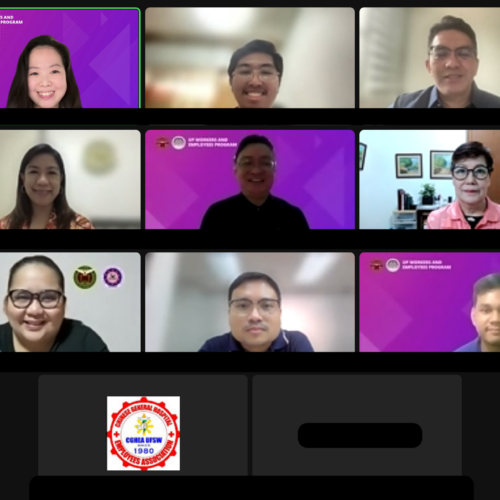
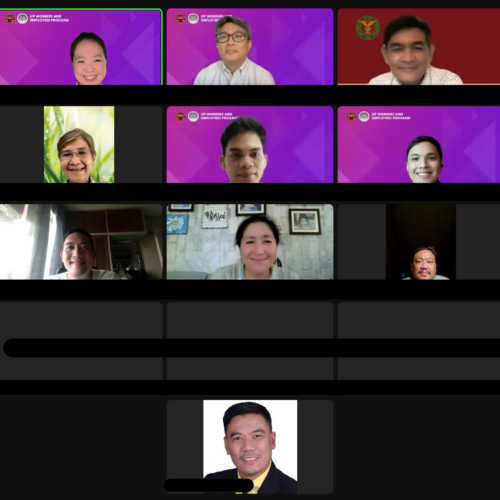
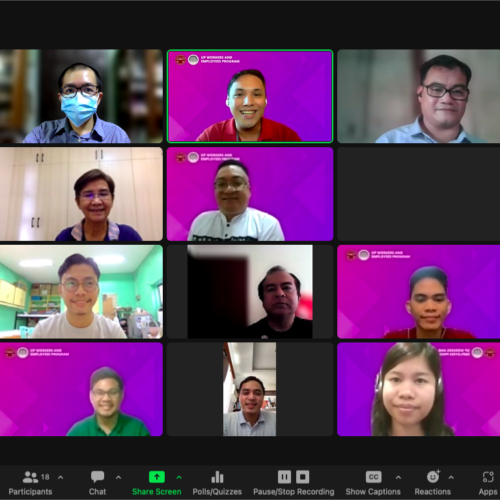
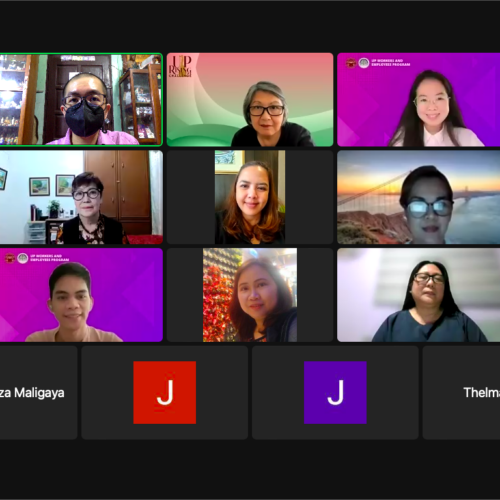
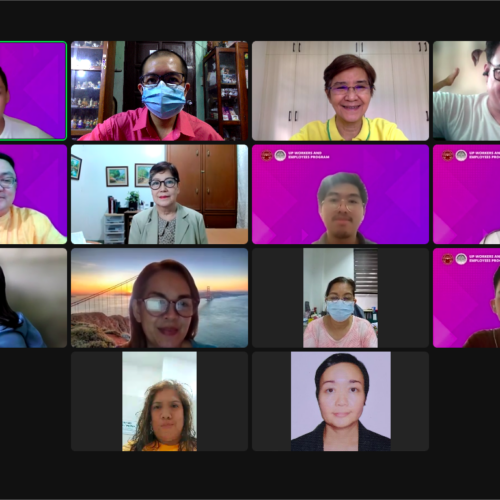






































































































 on the upper right corner to select a video.
on the upper right corner to select a video.